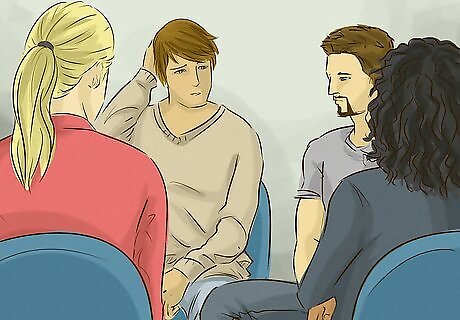
views
Addressing the Problem

Admit that you are emotionally abusive. Recognizing the problem and admitting that you are emotionally abusing others is the first step toward being able to change your behavior. Taking time to try and see the effects your abuse has on others will help you realize the extent to which you are being abusive. If you are unsure if your behavior is emotionally abusive, look at ways in which emotional abuse can be identified. Examples can include violent and aggressive language, such as name calling, yelling, and shaming; controlling behaviors, such as intimidation, threats, or monitoring and withholding money; or physical abuse, such as withholding food or water, or hitting, shoving, and pushing. Contact the National Coalition Against Domestic Violence immediately if your abusive behavior involves physical violence against a family member or spouse. Keep in mind that many people who abuse other people have been abused themselves. You might consider talking with a therapist about your experiences to help you move past what has happened to you and stop treating other people the same way. Oftentimes, you can notice that you're abusing people when your relationships and even your professional life starts breaking down because of the ways you treat others.

Identify the source of the abusive behavior. Identifying the source of abusive behavior will help you understand where the stress or pressure causing the abuse is coming from. The person you act angry toward or abuse emotionally may not be the problem, but only the victim. If you have problems in your life that you feel are beyond your control, you may lash out at an easy, convenient target, even one that has nothing to do with your real problem. For instance, perhaps it might really upsets you when people give you feedback, because deep down inside you're afraid you're worthless despite knowing it's not really true. Take time to think about what other elements in your life are causing you stress, like work, conflict with a loved one or spouse, or financial issues. Ask yourself questions like “Am I under too much pressure at work,” “Do I have any unresolved conflicts that follow me around,” or “Are there moments in my past that might be affecting my current behavior?” Consider whether you are engaging in drug or alcohol use. Using substances can contribute to abusive behavior.

Cut the source of the abusive behavior out of your life. Once you’ve identified the source or cause of your abuse you can begin to take steps removing it from your life. Although removing this source might feel like a relief, there are still many other behaviors and effects that need addressing in order to completely stop emotionally abusing others. Talk about quitting your job with a friend or family member if your work is causing too much stress. Seek financial advice from a financial planner if you are struggling with debt or making ends meet. If you suspect the source of your abusive behavior stems from an unresolved conflict or past trauma seek out help from a therapist or counselor.
Changing Your Behavior

Listen to the other person’s experience. Taking time to sit down with those who you have emotionally abused to hear their experience will help you gain perspective on how you being emotionally abusive and what the abuse’s effects were. Listening to those you have abused may often feel like an attack or accusation in itself. Rather than responding with more abuse, try to listen without an immediate response. Listen to others without becoming to defensive or making excuses. Keep in mind that it is normal to feel defensive, but if the other person was hurt by your behavior, then it is abuse. Try to avoid equalizing, minimizing, or denying their experience. Don’t make yourself the center of their story or experience.

Take responsibility. Hold yourself responsible and accountable for all the emotional abuse you’ve caused throughout a relationship. Although there may be many different sources or causes, you are the only one who could prevent you abusing another. Taking responsibility and holding yourself accountable for abuse takes a lot of courage and is necessary to begin moving forward with understanding and changing your abusive behavior. When discussing abuse, try using “I” statements like “I was too controlling when I wouldn’t let you leave the house without me,” or “What did it feel like when I was controlling?”

Respect the other person’s response. Do not expect pity from people who you have abused at this point, but be willing to ask for support from trusted friends and family members. Being accountable and taking responsibility for the abuse you’ve caused is not about others forgiving you, but about changing yourself and respecting others. Those who you have abused may not be in a place to be able to forgive you, and trying to use your accountability to gain the forgiveness of another can be seen as an extension of the abusive dynamic. Remember, nobody has to forgive you. Forgiveness takes time and should be allowed space. If, after you're forgiven you sometimes still feel like responding to comments from friends angrily, try to focus instead on using empathy, curiosity, and openness to try to understand where the other person is coming from.

Forgive yourself. Admitting responsibility and accountability is about self help, learning how and why we have harmed others, and learning how to stop. Although those you have abused may not be ready to forgive you, forgiving yourself will allow you to move beyond your abusive tendencies and leave abuse in the past. Reminder yourself of your commitment to change by telling yourself affirmations like, “Abusing others is a choice and I am going to do my best to change my behavior,” or “I can change my behaviors with patience, the right help, and hardwork.”
Getting Help

Seek out the help of a therapist, counselor, or life coach. There are many different specialized types of therapy, from cognitive behavioral therapy to group therapy, family therapy to journal therapy. Find a therapist best suited to the type of therapy you think will be most useful to you. Life coaches can also provide consistent long term strategies for self improvement, although some are not trained to deal with more severe types of behavioral or physical abuse. Try cognitive behavioral therapy if you would like help processing traumatic experiences, such as previous abuse, loss of a loved one, or feeling disconnected from others, that might be causing abuse. Try family or group therapy if your abuse is occurring within your relationships with your spouse, children, or siblings. You can also look into support groups. Try looking to Emotions Anonymous to learn how to cope with difficult emotions.

Consult friends and family. Seeking advice from your friends and family can help you gain perspective and support during your time when you are addressing your abusive behaviors. Friends and family can provide essential support toward self-betterment and self-help. Schedule weekly calls with a friend or family member to check in on your progress in therapy, conversations with those you have abused, or your general well-being. Be sure to seek out those who you feel comfortable being honest with about your abuse.

Contact domestic abuse help agencies. If the abuse you are enacting on others is physical, reach out to domestic abuse help agencies, like the National Coalition Against Domestic Violence, to find out your next best course of action. The NCADV also offers access to support groups and informational resources regarding intervention. Domestic abuse needs immediate attention and may require lawful intervention. Seek out the NCADV or local law enforcement to quickly address physical abuse.

















Comments
0 comment